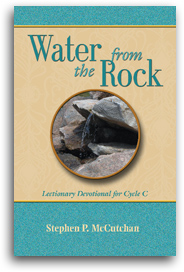Epiphany 2 / Ordinary Time 2
Devotional
Water From the Rock
Lectionary Devotional for Cycle C
Object:
... you save humans and animals alike, O Lord.
-- Psalm 36:6
This passage is a selection from a larger psalm that contrasts the self-centered nature of evil with the expansive nature of God's love. In contrast to humans that flatter themselves in their own eyes (v. 2), God's love extends to humans and animals alike (v. 6c). The absolute otherness of God is described as a love that is neither confined by time nor space. "Your steadfast love, O Lord, extends to the heavens, your faithfulness to the clouds." The image of a mighty mountain (v. 6a) is offered to describe God's righteousness. It is not going to be moved by the incidentals of life. God's judgments, upon which all human hopes and fears ultimately rest, are described like the great deep (v. 6b). For Israel, a land-based people, there was nothing quite so unfathomable as the depth of the ocean. The expansiveness of God's saving grace extended itself not just to humans but to animals as well (v. 6c).
The thread woven throughout scripture of God's care not only for the chosen people but also for all people is expressed here. The heart of all life is found in God. All people can find their security in God. "All people may take refuge in the shadow of your wings" (v. 7b). It is God's intent that they also find nurture in the abundance of God's creation (v. 8a) and joy in the vitality of life (v. 8b). While this part of the psalm is a magnificent hymn of praise, it also is a strong reminder to the faithful that God's love is not limited to the community of faith. While those who are separated from God may experience life as a parched desert, it is God's intention and therefore, the responsibility of those provided the gift of faith that they also discover the fountain and light of all life (v. 9).
-- Psalm 36:6
This passage is a selection from a larger psalm that contrasts the self-centered nature of evil with the expansive nature of God's love. In contrast to humans that flatter themselves in their own eyes (v. 2), God's love extends to humans and animals alike (v. 6c). The absolute otherness of God is described as a love that is neither confined by time nor space. "Your steadfast love, O Lord, extends to the heavens, your faithfulness to the clouds." The image of a mighty mountain (v. 6a) is offered to describe God's righteousness. It is not going to be moved by the incidentals of life. God's judgments, upon which all human hopes and fears ultimately rest, are described like the great deep (v. 6b). For Israel, a land-based people, there was nothing quite so unfathomable as the depth of the ocean. The expansiveness of God's saving grace extended itself not just to humans but to animals as well (v. 6c).
The thread woven throughout scripture of God's care not only for the chosen people but also for all people is expressed here. The heart of all life is found in God. All people can find their security in God. "All people may take refuge in the shadow of your wings" (v. 7b). It is God's intent that they also find nurture in the abundance of God's creation (v. 8a) and joy in the vitality of life (v. 8b). While this part of the psalm is a magnificent hymn of praise, it also is a strong reminder to the faithful that God's love is not limited to the community of faith. While those who are separated from God may experience life as a parched desert, it is God's intention and therefore, the responsibility of those provided the gift of faith that they also discover the fountain and light of all life (v. 9).


